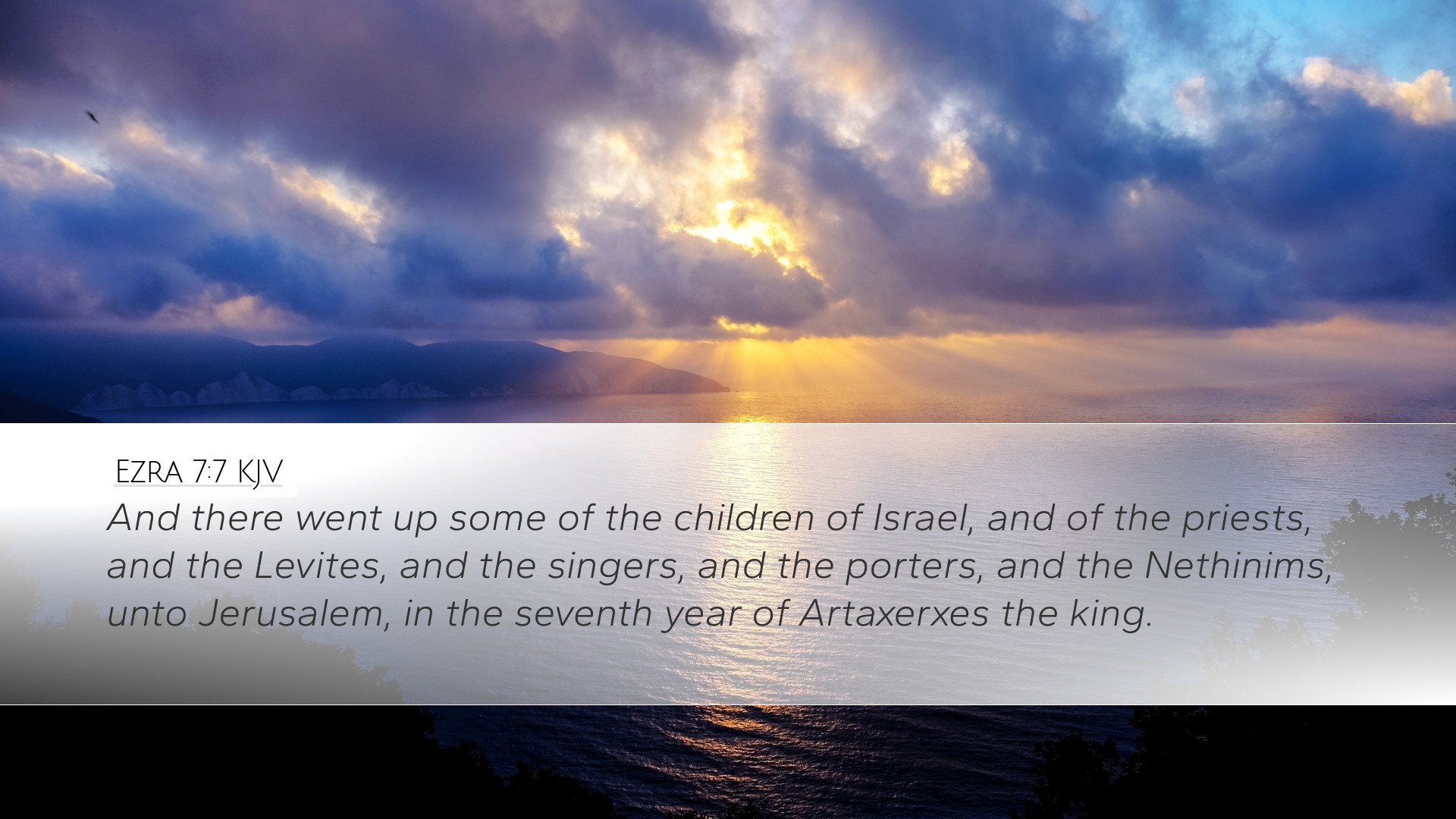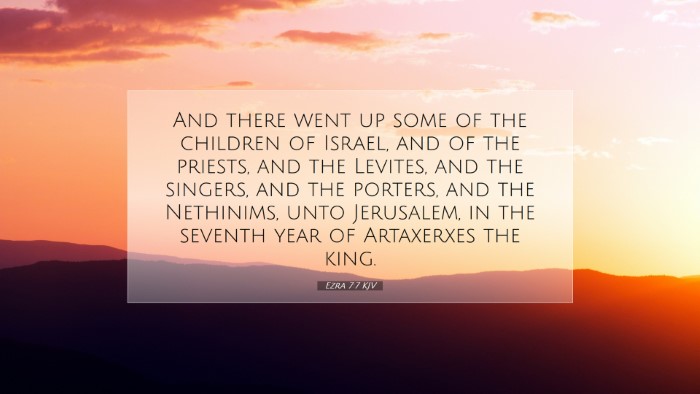Old Testament
Genesis Exodus Leviticus Numbers Deuteronomy Joshua Judges Ruth 1 Samuel 2 Samuel 1 Kings 2 Kings 1 Chronicles 2 Chronicles Ezra Nehemiah Esther Job Psalms Proverbs Ecclesiastes Song of Solomon Isaiah Jeremiah Lamentations Ezekiel Daniel Hosea Joel Amos Obadiah Jonah Micah Nahum Habakkuk Zephaniah Haggai Zechariah MalachiEzra 7:7
Ezra 7:7 KJV
And there went up some of the children of Israel, and of the priests, and the Levites, and the singers, and the porters, and the Nethinims, unto Jerusalem, in the seventh year of Artaxerxes the king.
Ezra 7:7 Bible Commentary
Commentary on Ezra 7:7
Text of Ezra 7:7: "And they came up to Jerusalem in the seventh year of Artaxerxes the king."
Introduction
The verse in Ezra 7:7 marks a significant point in the narrative of the return of the Jewish exiles from Babylon to Jerusalem. This journey occurred under the authority of King Artaxerxes, and it encapsulates critical themes of restoration and divine providence essential for understanding the historical and theological background of the post-exilic period.
Contextual Background
This passage occurs within the broader context of the books of Ezra and Nehemiah, which document the return of the Jews to Jerusalem after the Babylonian captivity. Under the Persian king Cyrus, a decree permitted the first group of exiles to return and rebuild the temple. Ezra's return, as indicated in this verse, signifies a subsequent phase of restoration, focusing on the spiritual reform and the establishment of the Law in Israel.
The Significance of Artaxerxes
Albert Barnes emphasizes the importance of the political context provided by Artaxerxes's reign. As the king of Persia, his decree and support were instrumental in the restoration of Jerusalem's religious life. The "seventh year" of his reign situates Ezra's mission within specific historical parameters that demonstrate God's sovereignty over nations and rulers.
Ezra's Role
Ezra, termed a "ready scribe," is a central figure in this narrative. Matthew Henry highlights Ezra's dedication to studying the Law of the Lord, his personal holiness, and his commitment to teaching God's statutes. This emphasis on the character and qualification of Ezra serves as a reminder that effective leadership in spiritual matters requires both knowledge and integrity.
Spiritual Leadership
- Character and Commitment: Ezra’s journey to Jerusalem was not only a physical return but a spiritual pilgrimage aimed at restoring proper worship.
- Study and Application: The text notes Ezra's deep engagement with the Scriptures, highlighting the need for leaders to be well-versed in God’s Word to teach and guide others effectively.
The Journey's Spiritual Implications
According to Adam Clarke, this journey is emblematic of a greater return to God’s intentions for His people. The physical act of returning to Jerusalem mirrors the spiritual calling of God’s people to return to a right relationship with Him. Clarke notes that the hardships faced along the journey point to the obstacles often encountered in pursuing spiritual renewal.
Challenges Faced
- Resistance from Enemies: Just as Ezra faced opposition, spiritual leaders today must contend with opposition that can manifest in various forms.
- Internal Struggles: The journey also symbolizes the internal struggles believers face as they seek to align their lives with God’s will.
Theological Reflections
The theological implications of Ezra 7:7 resonate deeply within the framework of God’s redemptive history. The return to Jerusalem is not merely a historical event; it is a testament to God's faithfulness in fulfilling His promise to His people. Henry notes that this passage illustrates God’s providence, as He raised up leaders like Ezra to effect spiritual revival.
Key Themes
- Restoration: The return signifies the restoration of both the physical structure of Jerusalem and the spiritual condition of its people.
- Leadership: God often uses willing individuals like Ezra to facilitate His plans, highlighting the importance of responsiveness to divine calling.
- Community Renewal: Ezra’s return is ultimately about the reestablishment of a covenant community under God’s law, reflecting the ongoing nature of God’s relationship with His people.
Conclusion
Ezra 7:7 stands as a pivotal verse in the narrative of restoration for Israel. It encapsulates the themes of divine providence, spiritual renewal, and the vital role of dedicated leadership in guiding God’s people. As pastors, students, theologians, and scholars reflect on this passage, they are reminded of the enduring relevance of Ezra's commitment to God’s Word and the call to leadership informed by spiritual integrity and dedication to restoration.


